Ethical Apparel Africa is a company co-founded by Keren Pybus based in Ghana and Benin, working with international brands who are interested in growing a manufacturing base in Africa with a positive social and environmental impact.
LoA found out more from co-founder and ceo Keren Pybus this month.
What does your company do?
Ethical Apparel Africa (EAA) is a sourcing company that provides international apparel brands with ethical, cost competitive and quality manufacturing solutions in West Africa. Our vision is to demonstrate that ethical manufacturing can and should be done at scale, not just associated with luxury or expensive products. Based in Ghana and Benin, EAA has a dynamic team bringing decades of experience from around the world in product development, quality assurance, account management, social impact, operations and finance. We work with West African factories to build technical and ethical standards to international standards. Our clients are international brands mostly from Europe and the USA interested in growing a manufacturing base in Africa with a positive social and environmental impact. EAA has a two-pronged business model. We provide brands with sourcing services - including raw material sourcing, product engineering and quality assurance – for which we charge brands a commission of the value of their product. We also function as a capacity building organization, providing technical and compliance support to African-owned factories.
“Ethical Apparel Africa was founded based on the core belief that all manufacturing can and should be done ethically. In 2015, while working together in West Africa, we realized if ever there was a place to prove this it was here.”
What inspired you to start your company?
EAA was founded based on the core belief that all manufacturing can and should be done ethically. In 2015, while working together in West Africa, we realized if ever there was a place to prove this it was here. Against the backdrop of rising prices in Asia and industry pressure to find its next manufacturing hub, we saw the fundamental advantages West Africa could offer: quick shipping times to the US/EU, duty advantages, low cost of living, and labor availability. The business opportunity was clearly there, but what inspired us to start EAA was the opportunity to do things differently: To get it right from the start, building a model of manufacturing that prioritizes both profit and people. For us, this starts with partnership. We met factory owners in Ghana and Benin who showed deep commitment to their workers and communities, but who struggled to expand due to lack of volume orders. We built our business model around enabling them to achieve their visions of worthwhile job creation at scale. We know that cost competitive and ethical production are not mutually exclusive. We work with our partner factories every day to continuously improve: to increase efficiency, go beyond compliance, and meaningfully impact workers’ lives. In addition to improving the quality of existing jobs, we measure ourselves on our ability to create new ones. We believe the creation of stable employment, particularly for women, is an incredibly powerful driver of sustainable change.
Why should anyone use your service or product?
Not only will we bring brands quality and cost competitive products, it is done alongside ensuring the Ghana and Benin industries are developing without having to race to the bottom. We are committed to being transparent in all we do and that includes open costings.
“We know that cost competitive and ethical production are not mutually exclusive. We work with our partner factories every day to continuously improve: to increase efficiency, go beyond compliance, and meaningfully impact workers’ lives.”
Tell us a little about your team
Our team comprises of 8 different nationalities bringing expertise from many of the large retail brands and manufacturing across the globe. We are mainly based on the ground in Ghana and Benin supporting the factories there.
Share a little about your entrepreneurial journey. And, do you come from an entrepreneurial background?
This is my first role as an entrepreneur in my own company, previously I had set new ventures up but within large companies.
What are your future plans and aspirations for your company?
By 2027, we aim to create 5,000 high quality, sustainable manufacturing jobs in West Africa.
“In addition to improving the quality of existing jobs, we measure ourselves on our ability to create new ones. We believe the creation of stable employment, particularly for women, is an incredibly powerful driver of sustainable change.”
What gives you the most satisfaction being an entrepreneur?
Being brave, learning from others and from our own mistakes plus seeing people thrive in a positive working environment.
What's the biggest piece of advice you can give to other women looking to start-up?
Network, network, network. People want to help others and there are so many people that have done part of your journey so learn from them.
Contact or follow Ethical Apparel Africa
WEBSITE | TWITTER | EMAIL kpybus@ethicalapparelafrica.com
Why LoA loves it….
Africa has a huge challenge on its hands, addressing the need to create large numbers of sustainable, high quality jobs, particularly in the manufacturing sector. So it is wonderful to see women entrepreneurs rising to this challenge. Keren and her team at Ethical Apparel Africa are a great example of what can be achieved when you have a big vision and the energy and commitment to make real change happen. --- Melanie Hawken, founder and ceo of Lionesses of Africa







